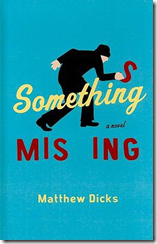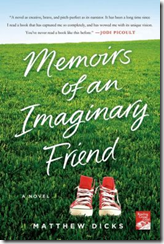One of the goals of my future podcast, at least until my theoretical listeners redefine my goal through their input, will be to offer unpublished writers, readers, and even fellow authors a glimpse into the daily life of an author.
It’s the kind of thing I would like to hear:
Successful authors talking about their careers, their daily routines, the nuts and bolts of the industry and the choices and challenges that they face on a daily and weekly basis.
Occasionally we will get a glimpse of an author’s life through an interview on radio or in print, but never have I been granted access to an author’s life over an extended period of time, probably (and thankfully) because they are too busy writing. I’m simply stupid enough to be willing to waste a few precious hours a week producing a podcast in hopes that someone wants the same thing I want and will care.
Oh, the title of the future podcast will be Author Out Loud, suggested by blogger Heather Clow.
The first segment of the podcast will focus on the things that have happened in my writing career during the previous week. It will be that ongoing peek into an author’s life that I would like to hear someday. This could include a discussion of the manuscript that I am working on, the promotion for my latest book, a description of a recent author appearance, a lamentation about my latest second place finish at a Moth StorySLAM, the editing and revising that I am doing with my agent or editor, the progress of film and television deals related to my books, the machinations surrounding the rock opera that my friend and I are producing, my recent forays into children's literature, and many, many more topics. A week does not go by that would not be filled with material to discuss.
The collection of email that I received today is a good example of something I might talk about for a minute or two in order to offer a peek into the day-to-day life of an author.
First, an email from a reader in Greece who read the Greek translation of MEMOIRS OF AN IMAGINARY FRIEND and wrote to me in perfect English.
Next, an email from the publisher of the audio version of MEMOIRS OF AN IMAGINARY FRIEND informing me that the book is going to be on the Audible homepage for a second week in a row.
Next, an email reader in Singapore writing to tell me that every copy of MEMOIRS OF AN IMAGINARY FRIEND is reserved for the next seven months in his local library. In addition, the library has 17 copies of UNEXPECTEDLY, MILO, and at the moment, all are checked out.
I should probably move to Singapore.
Next, three emails requesting author appearances at their various establishments. Two are from booksellers and one is from a charitable organization.
Next, an email from a clever and enterprising PhD student who wants to sit down and chat with me for an hour about writing and opened her email by informing me of a typo in the bio on my blog as a means of getting my attention.
It worked.
Next, an email from a book blogger with a list of ten questions for me to answer as part of an author Q&A that will appear on her blog.
Next, an email containing feedback from one of the readers of my current manuscript.
Finally, an email from a reader in the United States discussing how much the character of Max in MEMOIRS OF AN IMAGINARY FRIEND reminds her of her son.
All that arrived today, and it doesn’t include any of the communication I received on Twitter.
As you can imagine, I am forced to dedicate a significant chunk of time to responding to email each evening, and while this admittedly takes away from some of the time I have to write, today’s batch of emails were neutral or positive in nature, making it much more enjoyable to respond, and they did not require a great deal from me in terms of time or effort. I also responded to almost every email while my three month old son slept in my lap, so it’s debatable how much actual writing I would have managed in that time anyway.
The never-ending flurry of communication from readers and others related to my writing has been one of the most surprising aspects of my authorial career. I never expected readers to reach out to me as often as they do, and the seemingly unusual emails like the ones from the Singapore reader or the PhD student are unusual only in their specificity. Tomorrow I will receive an entirely different but equally unusual set of emails from people I can’t begin to imagine.
I never know what to expect when an email arrives pertaining to my career as an author, and it makes the job persistently interesting, occasionally unwieldy and always surprising.



